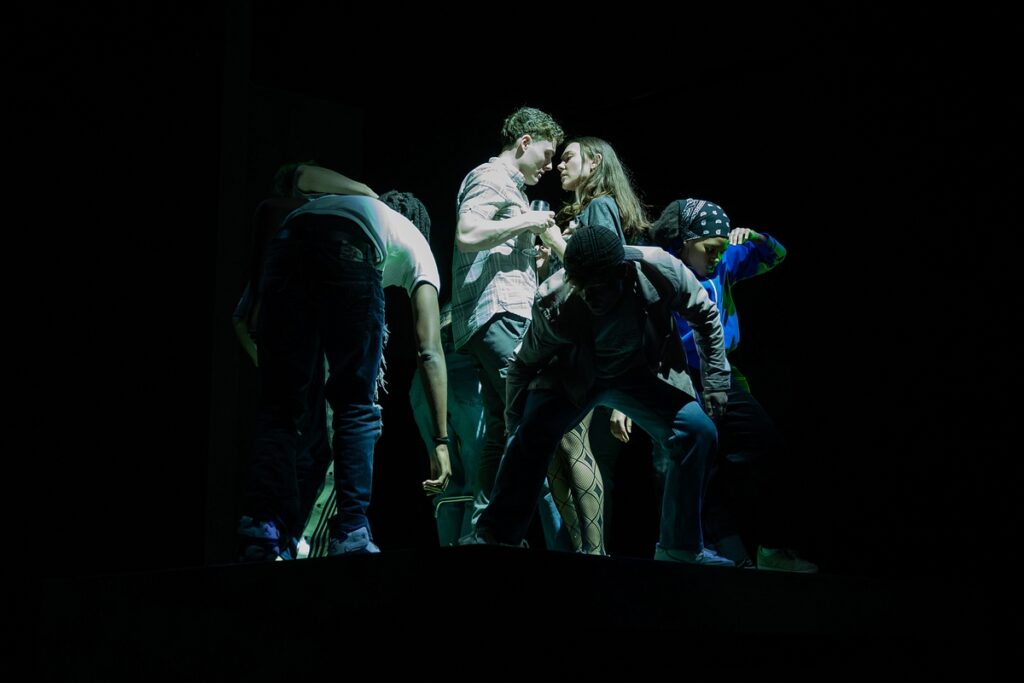On 7 April London’s Bush Theatre celebrated 50 years of discovering and developing new writing, directors, creatives, and acting talent. Many of these have gone on to dominate the arts and entertainment industries including Jonathan Harvey, Alan Rickman, Cush Jumbo, James Graham, Jack Thorne, Arinzé Kene, Victoria Wood, and Julie Walters.
To coincide with the anniversary, the theatre are running a special 50th Birthday Season which opens tomorrow night with House of Ife, a new play by Ethiopian-British writer Beru Tessema who may be set to join that list of industry greats. The play, directed by Bush Artistic Director, Lynette Linton and starring Jude Akuwudike, Yohanna Ephrem, Sarah Priddy, Karla-Simone Spence, and Michael Workeye, is a tense and captivating story of what it means to belong, and what happens when a family’s secrets shake its foundations.
Ahead of opening night we spoke with Tessema about the inspiration for the play, writing an epic family drama, and creating images with words.
The Understudy Q&A with Beru Tessema
Hi Beru, thanks for talking with us about your new play House of Ife. What can you tell us about the production?
House of Ife is an epic family drama about an Ethiopian-British family dealing with the loss of their first-born son. It is a play that deals with the consequence of migration, it is also an inter-generational drama about identity and belonging. It is directed by Bush Theatre Artistic Director, the brilliant Lynette Linton. We have an amazing cast, and it is the first play to kick-off the Bush’s 50th anniversary.
Where did the initial inspiration for the play come from and has your vision changed much throughout the development process?
I have always wanted to write epic family dramas that have the scale of an Arthur Miller play, but firmly rooted in contemporary London. I have always wanted to put the Grime aesthetic into this epic classical structure and House Of Ife is a play that does that, but it is also a multigenerational drama, it is not only about a younger generation of Londoners, it is also about their immigrant parents and their struggle to find a home and raise their children in a land that they were strangers to. The initial inspiration came while I was asked to pitch an idea as part of the Bush’s Emerging Writer’s Group and I had a sketch of an idea about a family dealing with grief and this somehow being a consequence of migration. The development process didn’t change the idea but rather nurtured and distilled it.
What do you think audiences will take away from the production?
I hope audiences will be able to see their own families in the play and I hope it will be a moving, uplifting and cathartic experience.
You were part of the BBC Drama Writersroom 2020/21 – has that experience changed how you approach writing?
Being a part of the BBC Drama Room last year helped me to develop my approach to story structure. We were given workshops by people like John Yorke who has such an insightful approach to story and structure. I was also working closely with my script editor, Josie Burke while at the writer’s room who taught me a lot about character and structure.
 |
| House of Ife promotional image |
You originally trained as an actor at RADA before moving into writing and directing. Has that training and broad experience impacted the way in which you construct your characters and narrative?
Yes, absolutely. Being and actor and training as an actor has deeply informed the way I write a scene and construct a character. My actor’s brain allows me to inhabit both the scene and the character as I write, allowing the character’s behaviour to feel organic and truthful. I am also very interested in the way people speak and patterns of speech which is very much informed by my actor’s approach.
You’ve co-written a feature film (Barley Fields on The Other Side of the Mountain) and have written a number of short films. How does the process of screenwriting and playwriting differ for you, or are your ways of working similar?
Screenwriting is very much about the image, it is visual story telling. The dialogue is often minimal, and I tend to lean into communicating who the character is by the way the behave rather than the things they say. Behaviour is as important in playwriting, but playwriting is a much more literary form. It is about words, language and the way characters speak as well as how they behave. With playwriting the images are in the words whereas with screenwriting the images are on the screen, that is the main difference for me. There are many similarities also, such as themes, character and structure of story.
Finally, how would you describe House of Ife to someone considering buying a ticket for the show?
House of Ife is an epic family drama set in present day London. It is tender and explosive. It is about grief but full of moments of joy and magic.
















